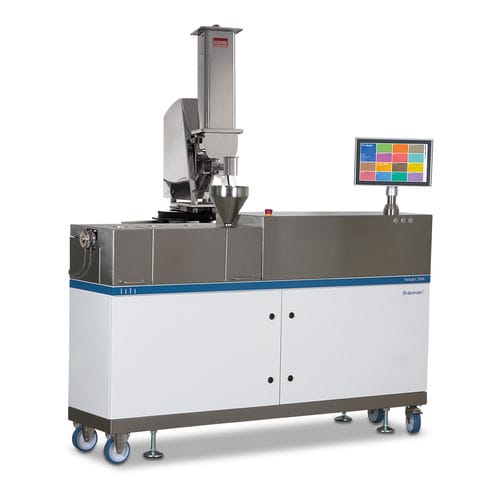
- Production Machines
- Plastics Processing
- Compounding extruder
- Anton Paar TorqueTec GmbH
- Products
- Catalogs
- News & Trends
- Exhibitions
Laboratory extruder TwinLab-C 20/40compoundingtwin-screwcompact

Add to favorites
Compare this product
Characteristics
- Applications
- compounding
- Number of screws
- twin-screw
- Other characteristics
- laboratory, compact, for bioplastic
- Output
Max.: 20 kg/h
(44.0925 lb/h)Min.: 1 kg/h
(2.2046 lb/h)- Screw diameter
20 mm
(0.8 in)- Maximum speed
600 rpm, 1,200 rpm
(3,770 rad.min-1, 7,540 rad.min-1)- Torque
80 Nm
(59 ft.lb)- Temperature
250 °C, 400 °C
(482 °F, 752 °F)- Maximum pressure
300 bar
(4,351.1 psi)- Overall length
445 mm
(18 in)- Overall width
1,915 mm
(75 in)- Total height
1,565 mm
(62 in)- Weight
480 kg
(1,058 lb)- Power
10 kW, 16 kW
(13.6 hp, 21.75 hp)
Description
What is this instrument for?
With the TwinLab-C 20/40, Brabender offers a stand-alone twin screw extruder especially designed for applications in a laboratory. It is used for product and recipe development,
feasibility studies in the context of process developments, material development, analysis of the process-dependent material behavior or developments in recycling.
Furthermore, it can be applied for raw material quality control, laboratory-scale production (e.g. sampling for customers) and compound preparation of test samples for mechanical or dynamic testing as well as for film cleanliness testing.
New compounds with or without additives or fillers, e.g. from thermoplastics, technical plastics, thermoplastic elastomers, ceramic materials or metal oxides, can be tested and developed on a laboratory scale.
What does this instrument measure?
■ Material temperature and pressure
■ Load / Torque
■ Viscosity (optional)
■ Residence time
Why is this important?
The measured values can be used to infer the relationship between extruder settings, process conditions and product properties. Due to the low throughput rates and the compact design of the machine, changes to extruder settings can be effected more quickly.
In general, the application of a laboratory extruder enables the development of new products, recipes and processes without impacting the ongoing production. Only a small amount of raw material is required for this kind of laboratory-scale process simulation. This
is particularly advantageous when expensive or poorly available material has to be tested. Likewise, only small amounts of product have to be disposed of.
VIDEO
Related Searches
- Grinding mill
- Pelletizer
- Screw extruder
- Food lump breaker
- Rotor lump breaker
- Twin-screw screw extruder
- Plastic pelletizer
- Single-screw screw extruder
- Plastic pulverizer
- Laboratory grinding mill
- Compounding screw extruder
- Compact grinding mill
- Dry milling grinding mill
- Compact screw extruder
- Laboratory screw extruder
- Grain lump breaker
- Variable speed grinding mill
- Powerful grinding mill
- High-throughput screw extruder
- Laboratory pelletizing system
*Prices are pre-tax. They exclude delivery charges and customs duties and do not include additional charges for installation or activation options. Prices are indicative only and may vary by country, with changes to the cost of raw materials and exchange rates.





